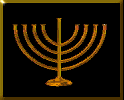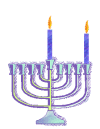![]()
CHANUKAH
![]()
 THE CELEBRATION OF Chanukah
THE CELEBRATION OF Chanukah
Every year between the end of November and the end of December, Jewish people around the world celebrate the holiday of Chanukah, the Festival of Lights. Chanukah begins on the 25th day of the Hebrew month of Kislev, but the starting date on the western calendar varies from year to year. The holiday celebrates the events which took place over 2,300 years ago in the land of Judea, which is now Israel.
Long ago in the land of Judea there was a Syrian king, Antiochus. The king ordered the Jewish people to reject their G-d, their religion, their customs and their beliefs and to worship the Greek gods. There were some who did as they were told, but many refused. One who refused was Judah Maccabee.
Judah and his four brothers formed an army and chose as their name the word "Maccabee", which means hammer. After three years of fighting, the Maccabees were finally successful in driving the Syrians out of Israel and reclaimed the Temple in Jerusalem. The Maccabees wanted to clean the building and to remove the hated Greek symbols and statues. On the 25th day of the month of Kislev, the job was finished and the temple was rededicated.
When Judah and his followers finished cleaning the temple, they wanted to light the eternal light, known as the N'er Tamid, which is present in every Jewish house of worship. Once lit, the oil lamp should never be extinguished.
Only a tiny jug of oil was found with only enough for a single day. The oil lamp was filled and lit. Then a miracle occurred as the tiny amount of oil stayed lit not for one day, but for eight days.
Jews celebrate Chanukah to mark the victory over the Syrians and the rededication of the Jerusalem Temple. The Festival of the Lights, Chanukah, lasts for eight days to commemorate the miracle of the oil. The word Chanukah means "rededication".
In America, families celebrate Chanukah at home. They give and receive gifts, decorate the house, entertain friends and family, eat special foods, and light the holiday menorah.
Hanukah is the story of a great victory of the Jews over the Syrian-Greeks. In 165 BCE, led by the Hasmonean family of Mattathias the High Priest and his youngest son, Judah, the Jews succeeded in evicting the Syrian-Greeks from Israel and restored the Temple.
According to the Talmud, after the Temple had been cleaned and the Priests were ready to light the Temple menorah, they could find only one jug of oil that was fit to use. This was only enough for one day, but it lasted for eight. This is why Hanukah is eight days long. For eight days beginning on the twenty-fifth day of the month of Kislev we light the menorah to celebrate the victory and the miracle of Hanukah.
Hanukah comes from the Hebrew word "Khanu" meaning 'and they
rested,' and from the Hebrew date Kaf Hey which equals 25. That is why we
celebrate Hanukah beginning on the 25th of the month of Kislev.
![]()
Miracle of the Oil
Why is it important that the oil lasted eight days?
In the temple, a menorah was lit every day. The oil used in the menorah was the purest olive oil. The rabbis say the oil was so pure, only the first drop of oil from each olive could be used. Because of the need for strict purity of the oil, it took seven days to make a single batch of oil.
The small jar of oil that had not been disturbed lasted for the one day it was expected to last and continued for the full week it took to make new oil.
![]()
Hannah and Her Seven Sons
Hanukah is the story of heroes and bravery. It took great courage to go against the king and not worship idols. It took courage to fight against a powerful enemy and win as the Maccabees did.
One of the most amazing parts of Hanukah is in the Book of the Maccabees. It is the story of Hannah and her sons. She loved them very much and they were loyal to HaShem. They would not do what the king wanted them to do and worship idols.
One day the soldiers came and took Hannah and her sons away. They brought them to the church where there was an idol of Zeus and ordered them to bow down and worship and say that they accepted Zeus as their god. Hannah and her sons refused.
The soldiers killed her oldest son, hoping that when the others saw this they would worship their idol. But they did not. One after the other they were killed as was Hannah. She died declaring her faith in HaShem.
![]()
Judah Ha Maccabee
For three years Judah the Maccabee led his followers, those loyal to HaShem, against the Syrians. The Syrian Greeks had weapons, the Maccabees did not. The Jews were greatly outnumbered.
They hid in the Judean hills, and attacked whenever they could. Slowly but surely, they wore down the enemies, and retook Jerusalem and cleaned out the temple of the idols and restored it. That is the festival of rededication called Hanukah.
![]()
 The Menorah
The Menorah
The Menorah or candle holder is a really important part of the tradition of Hanukah. It is why we call the holiday "the festival of light".
We light the menorah from the left side to the right side.
We place the candles in the menorah from the right to the left. When we light the menorah we say the blessings for the candles.There are many different styles of menorot (plural for menorah). In most cases the Shamash (the helper candle) is in the middle or to the left side. Some are made for burning oil and some for candles.
![]()
One of the best known symbols of Chanukah is the Dreidel. A dreidel is a four sided top with a Hebrew letter on each side.
The four letters are: SHIN, HEY, GIMEL and NUN
These letters mean "A Great Miracle Happened There. "In Israel the dreidel is a bit different in that their letters mean " A Miracle Happened HERE!"
Dreidel is also a popular game played during the Holiday. Players use pennies, nuts, raisins, or chocolate coins (gelt) as tokens or chips.
The player spins the dreidel. When the dreidel stops, the letter that is facing up decides the fate.
NUN - nothing happens - next player spins the dreidel
GIMEL - player takes all tokens in the pot
HEY - player takes half of the pot
SHIN - player must put one token into the pot
Copyright ©Emotions Greeting Cards a division of VH Productions 2000-2002